PRINCE / “Uptown”
For many coming from the Black Power or Afrocentric movements, Prince’s imagery seemed to be a smack in the face at all the work that had been done to liberate African people from the chains of whiteness and the low self-esteem or outright self-hate that came with living under the umbrella of whiteness.
—Slight paraphrase of a point made last week by C. Liegh McInnis
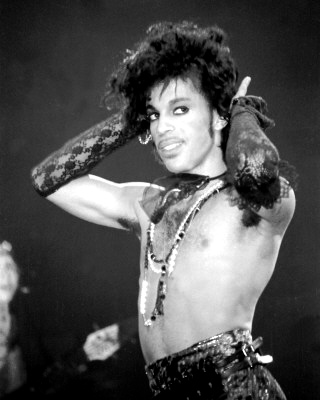
What could be a bigger affront to proud-but-tired African-American parents who’d come of age during the Civil Rights era than some skinny mulatto cross-dressing freak with a perm in his hair and a white girl on his arm? Actually, I can answer that question. I know what could be a bigger affront. That their kids would be absolutely captivated by the dude. That their sons would want to be him and their daughters would want…well, we can imagine what the daughters wanted.
Here’s the thing. Just as C. Liegh mentions that his Dad maybe shouldn’t have taken him to see Prince open for Rick James back in 1980, it occurs to me that maybe my Dad shouldn’t have let me and my sisters listen to Dirty Mind whenever and however loud we felt like it…when I was nine. It’s almost as if our parents couldn’t have imagined that this little imp would cause any significant trouble. He was too insubstantial, too effeminate, too light (in both senses of the word). They were wrong on all counts.
The problem wasn’t that Prince was saying anything so ‘nasty’ that we kids wouldn’t have heard it anywhere else. It was that, for Prince, the entire world—the entirety of existence, even—filters through a belief system in which sex plays a central role. Just as the optimist sees the world through rose-colored glasses, or as the revolutionary sees the world through the lens of class struggle, Prince sees the world through the prism of sex. Through his music, Prince passed on that way of seeing the world. Of course, all of Prince’s fans didn’t simply buy into his fantastical, utopiatic vision hook, line and sinker—human identity is more complex than that. But many of us were affected by it…some more deeply than others. For parents, especially those who were raised with the understanding that being simultaneously black and sexual could land you in a world of trouble (and not just religious trouble), Prince had to be a concern.
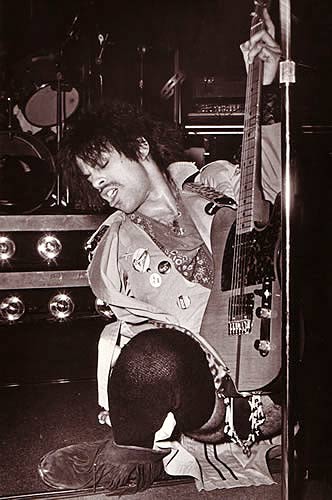
I don’t mean to imply that older folks’ problem with Prince boils down to just sex and freakiness. After all, Kalamu is a big Macy Gray fan and, clearly, that girl needs some help. I think it’s moreso Prince’s image that creates the problem. There was this accepted version of reality during the Civil Rights Movement that equated homosexuality with both weakness and whiteness. Meaning, a ‘real black man’—whatever that means—couldn’t possibly be a fag. I’m not saying Kalamu holds that sort of belief now—if anything, I’d say his attitude towards homosexuality is more liberal than mine. (For that matter, I’m not even saying Kalamu was a homophobe back in the Sixties or Seventies.) What I am saying is, I was never socialized to believe that intimations of femininity in a man made that man either less manly or less black. Like C. Liegh, it never really occurred to me to think Prince might be gay. Prince’s detractors and critics might’ve had questions about his sexuality, but his fans didn’t. I just figured dude was a freak and kept on rolling. I knew lots of off-the-wall cats…especially after I started meeting white people. So my response to the makeup and involved hairdos and high heels was pretty much a shrug. I don’t know that folks of Kalamu’s generation can honestly say the same.
Prince began his recording career with Warner Bros. in 1978 and there followed two albums of (relatively) conventional pop/soul during which he gradually found his voice and developed his worldview.* By Prince’s third album, Dirty Mind, he knew exactly what he wanted to say and how he wanted to say it. Dirty Mind is Prince’s first ‘mature’ album, it remains one of my favorites and, with apologies for cramming three distinct ideas into one overly-long sentence, I maintain that the title is at least partially sarcastic. The album includes a political song (“Partyup”), a break-up song (“When You Were Mine”), a self-discovery song (“Uptown”), a self-defining song (the title track) and so on and on, but in all of them, sexual freedom (some would say sexual deviancy) plays a major role. Prince’s major statement was then, and for many years remained, “I’m not like the rest of you because I’m not uptight about sex.”
At first glance, it seems both a minor and oddly reactionary statement, particularly coming from someone who, at one time or another, has been called a genius by anyone with ears and a word processor. But let’s throw some context in here. If recent reports are to be believed, Prince was raised as a Seventh-Day Adventist, a fundamentalist denomination of Christianity. At risk of delving too deeply into a subject about which I know little, the central theorem of Christianity, as I understand it, is that a deity impregnated a virgin in order to give a fallen world (a world of his own creation) a savior. My admittedly heathenistic interpretation? Sex is so filthy an act, that God Himself wouldn’t stoop to engaging in it…even with a ‘virgin.’ (I still haven’t figured out how is it that Mary and Joseph were married…or betrothed…or engaged or something, yet Mary remained a virgin. Or did God impregnate Mary through Joseph? Well…in any event, that’s another story for another time.)
In many sects of Christianity, it isn’t just sex out of wedlock that’s taboo, it’s even thinking about sex out of wedlock. “Impure thoughts,” and the like. Anyone who’s ever been a teenager can tell you that barely a minute goes by—awake or asleep—when one doesn’t think about sex. It’s nature’s way: we’re procreation machines. It’s what we do. It’s almost as if fundamentalist Christians would have it that being a normal red-blooded human is, in and of itself, a sin. Given the weight of all of this religious sanctimony, Prince’s defining statement is about a lot more than sex and sexual freedom. It’s also about religious freedom, personal freedom, political freedom, social freedom…even intellectual freedom. In many of his better records, Prince makes the case for the individual to be free to be free. In other words, it’s not good enough to be able to sit at the lunch counter or ride at the front of the bus. Prince wants to sit at the lunch counter and he wants to ride in the front half of the bus, but he wants to do so dressed however he wants to dress and accompanied by whoever he wants to be accompanied by. It’s a cold, false freedom that restricts one to the rules, norms or wishes of the freedom fighters. So, in Prince’s worldview, the wishes of our parents are as much as a restriction as are the laws of the state or the mores of religion.
Now, given all of this, in recent years we have Prince going full circle, returning to a faith that adheres to fundamentalist beliefs based on Biblical literalism. What does that say about him? What does that say about our society? What does it say about this music blog that I’m 1,000 words in and I haven’t talked about music yet? Maybe next time….
* I have to say ‘relatively,’ because a close listen will reveal that Prince was already tentatively heading in the direction he’d eventually embrace.
—Mtume ya Salaam
A Preamble to Individual Liberation
Dirty Mind (1980) is Prince’s third album. This, although just the beginning of Prince’s foundation in the quest of creative, social, racial, and sexual freedom, is viewed as the Prince essential by many popular music critics. The title track, “Dirty Mind,” is a revolutionary understanding of sexual thoughts (and other rebellious thoughts) as being normal. Dirty Mind may have not been a philosophy, but it is a record that espouses a defiant attitude towards human boxes and being restricted by anyone other than oneself.
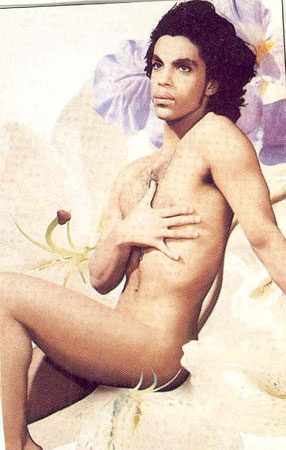
In Dirty Mind, Prince is both reinventing and breaking traditional stereotypes held for African Americans. James Baldwin asserts “to be colored means that one has been caught in some utterly unbelievable cosmic joke...One’s only hope of supporting, to say nothing of surviving, this joke is to flaunt in the teeth of it one’s own particular and invincible style!” David Hill author of Prince: A Pop Life points out, “Dirty Mind was nothing, if not the flaunting of a particular style in the face of suffocating expectations!” Prince was becoming the sexually obsessive black male, preying on young white girls. And yet, at the same time, dealing with social issues and building an ambisexual identity, he was stepping into the world of rock-n-roll reserved for white males. As Baldwin affirms, “An American Negro male is a kind of walking phallic symbol which means one pays, in one’s own personality, for the sexual insecurity of others. The relationship, therefore, between a black boy and a white boy is a very complex thing.”
Throughout his career, Prince has paid for the sexual insecurities of both white and black males. Aside from Little Richard, no African-American male has successfully existed as some type of ambiguous sexual identity. And even in the case of Little Richard, he was, for many years of his career, delegated to play the role of the colorful, humorous homosexual. It is in Dirty Mind that Prince evolves as a totally new and unique character to black music, able to have all of the emotions and characteristics of a female, yet able to display all of the machismo attitudes of traditional rock-n-roll males, a duality that only white rockers such as Bowie and Jagger were allowed to encompass. With the mythic, flagship capital city of Uptown given as the recording location of Dirty Mind, Prince is able to set a surreal tone of a haven for outcasts. “Uptown” is about a fictional area of a city that exercises the belief of cultural relevancy as its means of providing outcasts with a place to be themselves, “Our clothes, our hair, we don’t care, it’s all about being there...Uptown...set your mind free....”
“Head” and “Party Up,” sum up the entire album and its significance: complete freedom through a sexual revolution. Let’s take back our bodies; it’s the only thing we have. In “Sister,” Prince shows how one is assigned a political identity by having his sexual identity assigned for him through molestation. This molestation, an act of war, which he then parallels in “Party Up” by showing how the young are forcefully assigned a position of submission or inferiority by the elders of the state. This is the first example of Prince creating sexual energy and anxiety and then transferring it to a socio-political topic. “Party Up” openly criticizes war and all governmental officials who approve of war. Prince asserts that it is immoral to kill the youths of the world over the whims of a few government officials, especially when the youths, specifically poor youths, have no say in policy making and are almost powerless to escape from their assigned category. In “Party Up” the youth are assigned their roles in the same manner that the molested male is assigned his role in “Sister.” “Because of their half-baked mistakes, we get ice cream no cake. All lies no truth, is it fair to kill the youth!?!” “Party Up” has the tone of intolerance and declaration. The revolution had started; the youths of today were not going to stand for the destruction of themselves or their world through confining, arbitrary identity assignment. “You’re gonna have to fight your own damn war, cuz we don’t wanna fight no more!” Prince further elaborates:
“I just seem to read about a lot of politicians who’re all going to die soon, and I guess they want to go out heavy because they’re prepared to make a few mistakes and end up starting a war they don’t have to go out and fight...I just think the people should have a little more to say in some of these foreign matters. I don’t want to have to go out and die for their mistakes.” (Fudger 23, 25)
“Head” then ejaculates the sexual liberation. It is a take on the street saying, show me a guy who does not perform oral sex, and I will show you a guy whose girlfriend I can take. Show me a guy who is not sexually free, and I will show you a guy who is oppressed in every aspect of his life. A lot of Dirty Mind is street corner philosophy. The guy got the girl because of an open sense of sexuality, allowing him to do anything for her pleasure. “…morning, noon, and night I give you head.” This is another reversal of gender roles, especially for black males, where the male is catering to the whims of the female. Yet, Prince manages to subvert or manipulate this role reversal by maintaining control of the female’s climax or sexual pleasure.
“When I met you, you were on your way to be wed. You fool, you married me instead. Now morning, noon, and night I give you head.” So, on the one hand while the female is getting the sexual pleasure, she is still seen as the one who was seduced, mostly because of her naiveté. “I remember when I met u, baby, u were on your way to be wed… [and she said] I’m just a virgin, and I’m on my way to be wed, but you’re such a hunk, so full of spunk….” “Head” knocks down all of the barriers that were being placed upon Prince and other black artists. Not only was the topic taboo for a young black artist; the music, a rock/funk fusion with a soul falsetto, captivated the urban and suburban streets of America, allowing black artists to continue their tradition of representing the totality of their musical history, letting them play what was in their hearts and not what was on a contrived playlist. “Head” also continues the modification and expansion of the myths of African-American sexuality. In the early Eighties, the prevailing thought was that black men did not perform oral sex. It was an affront to their “supernatural” masculinity. The myth was that brothers did not need to give head. Oral sex is an act committed by a man who is not well endowed enough to please a woman. Then here comes Prince casting off one stereotypical role to take up another, all the while keeping the stigma of the erotic, exotic black male. R&B was never like this. Teddy Pendergrass and Marvin Gaye were men’s men. Prince manages to reintroduce them to Little Richard. “Tutti Frutti” combines with “Let’s Get It On” and “Turn Out the Lights” to produce a freaky sexual satisfaction all for the pleasure and command of the female.
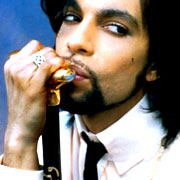
Dirty Mind is a culmination of ideas that were revolving around the edges of black music and black culture. We must understand that the original lyrics to “Tutti Frutti” are “Tutti frutti, good booty” and not “Tutti frutti, oh Rudy.” Sexuality in the African-American culture only becomes an issue when the growing black middle class becomes worried that their sexual objectification by whites will hinder and impair their desires to assimilate into the white power structure. The black middle class took on the same ideals about the body as their white masters and became very careful and selective about how they allowed themselves to be presented. The black juke joint was not a place where this new middle class would go. As an alternative, Prince is attempting to magnify his sexuality, hoping that it will be both titillating and freeing, in the same manner that Presley’s shaking of his white ass was liberating to millions of white people. So in a very specific sense, Dirty Mind is a work which only could have been produced by an African American. His is the choice of attempting, simultaneously, to assimilate, pacify, and assert his own sense of whom he is as an individual.
The plight of the African-American individual is a dual journey which is as much internal as external. This is the “Double Consciousness” that Du Bois discussed. On the one hand, as a black man, Prince is attempting to force his way into the waters usually waded by white men: bashing, straight ahead, and introvertedly driven rock-n-roll. R&B confines the African American to being a member of the group. R&B is not nearly as open to individual interpretation as jazz or even blues. It is a quite external medium where the artist is expected to wear or at least connect to the clothing (ideals and identity) of the line of great performers. On the other hand, rock-n-roll allows white acts to root or ground themselves in the history of black music, while giving them the freedom to interpret and create at will. Thus, acts such as the Beatles, the Rolling Stones, Aerosmith, and others, are able to build on the back of black music and then establish themselves as unique acts by impregnating black beats and rhythms with their European existence and ideals as in the instance of Led Zeppelin. Black acts have seldom been given this same opportunity and freedom. Although much of this has to do with white males controlling the industry of popular music, a good bit of this also has to do with African Americans’ rocky search for, struggle over, and attempt to reconcile the individual identity with and to the racial identity. Dirty Mind very allusively gets at this problem through the liberation of the body. It may be a flawed plan, but it was a plan that illuminated a path for the likes of Terence Trent D’Arby, Lenny Kravitz, Me’shell Nedegeocello, Alisha Keys, and Andre 3000 of Outkast.
—C. Liegh McInnis
Fathers & sons
Mtume expressed it in personal terms, C. Liegh expressed it in generational terms, and of course Prince has been expressing it in musical/theatrical terms throughout his career; all of them are addressing the perceived split between fathers and sons.
In Mtume’s case, he wonders aloud and then makes a judgment: “It’s almost as if our parents couldn’t have imagined that this little imp would cause any significant trouble. He was too insubstantial, too effeminate, too light (in both senses of the word). They were wrong on all counts.”
Kalamu stands on the facts. The facts are that Mtume and all of his siblings had the freedom to listen to Prince as long and as loudly as they wished. To be clear, it had nothing to do with Prince per se. They could also listen to Richard Pryor, P-Funk, some of the raunchiest blues you ever might (or might not) want to hear, etc., etc., ad infinitum. And Mtume, you are wrong on that count, because listening to the “little imp” did not ruin you or your siblings.
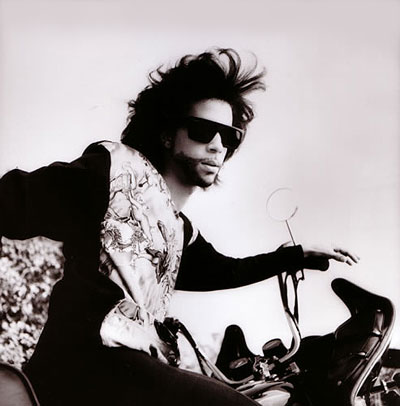
I believe that Prince seemed revolutionary to children coming of age in the Eighties precisely because other barriers had already been addressed and because, as you perceptively noted Mtume, sex is the driving preoccupation of most American teenagers, especially given that mass media was then beginning its most liberal exploitation of sexuality, partly as a result of the Sixties revolution. I could go further into this, (and at some point would like to address some of the issues that C. Leigh raises about the Civil Rights generation) but, in the context of BoL, let’s just stick with the Prince thread.
Although I didn’t take you to see it, Mtume, we both saw Purple Rain (the movie). It doesn’t take a psychiatrist to see that Prince is caught up in working out personal identification issues, i.e. Black father / White mother. In that regard what seems to be ambiguity is actually nothing more that acting out white/mother/female and black/father/male on the stage, and therefore making it bigger than life, hyper black-male/hyper white-female. Add to that the little man syndrome, 5’3” tall and built like a supermodel. And then you add the fundamentalist Christianity atop that. What results is a fucked-up sign of the times.
Again, I stand on the facts. I know what I say next is going to sound cold-hearted and insensitive, but check this: Prince is now twice-divorced, no children (his only son died of a very rare disease as an infant), and currently the man needs a hip replacement operation as a result of wearing high heels most of his adult life but is currently deferring that operation because his religious beliefs reject blood transfusions.
Y’all can call him a revolutionary all you want, but that’s not revolution, that’s confusion, and I think deep down inside all of you know it. You might want to have the fame and fortune that Prince has, but I doubt any of you wants to be live the reality that Prince is dealing with. Hell, Mtume, forget the high heels, the hip replacement, divorces, etc.; I know good and well that you weren’t raised Seventh Day Adventist and aren’t about to become a Jehovah's Witness.
I could see myself being John Coltrane. Can you see yourself being Prince?
This revolt of the sons is partially about the dominant view in a dog-eat-dog society. But there is another way. Mtume, I don’t have to remind you of the many, many New Orleans musical families in which fathers and sons not only get along, they play with and are strengthened by each other. In your home town there is no revolt of the sons against the fathers, but rather a continuation of the traditions from father to son. In New Orleans, this is true not just in music, but also in costuming as Mardi Gras Indians, in the construction trades, in the culinary arts, and so forth.
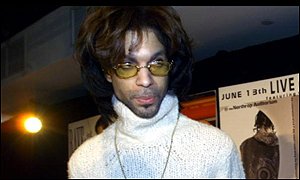
Prince’s music strikes me as interesting and occasionally brilliant, but it’s not something I need or want to listen to on a regular basis. His current music lacks the passion of his past precisely because his past explorations came to naught and he doesn’t have a clue as to what to do next to find fulfillment.
If you look at the current musical scene in all its diversity and complexity, you find more influences grounded in the music of Prince’s father than of Prince, by which I mean more contemporary artists are influenced by jazz and soul/funk music than by the glam-pop of Prince.
Does that mean that Prince’s music is meaningless? No. Does that mean that Prince’s music is not good music? No.
You want a comparison for Prince. Think James Dean. A super-talented actor who died relatively young while driving a fast car. James Dean had a potentially brilliant career, but death cut it short. Prince had a potentially brilliant career, but success cut it short. Unless (and until) there is a major change in his life, Prince’s best music is behind him, way behind him.
Dirty Mind is an adolescent mind. My man had a ton of issues to deal with, unless and until he does, he’ll never be able to move on and make music that lives up to the obvious wealth of talent that he has.
—Kalamu ya Salaam
This entry was posted on Sunday, October 29th, 2006 at 1:39 am and is filed under Classic. You can follow any responses to this entry through the RSS 2.0 feed. You can leave a response, or trackback from your own site.
4 Responses to “PRINCE / “Uptown””
October 31st, 2006 at 4:47 pm
I haven’t been here in awhile. Nice welcome back: Prince. Old school Prince, scrumptious, mmmm mmmmm.
Back in the day, I was allowed to listen to one side of "Purple Rain." What does that mean? Of course it means I listened to the other side. I closed the door, danced, fantasized and sang the heat I hoped would seep into my future. Back then I wasn’t thinking about music in the conetext of movement or anything like that, my dears, I was partying and wondering what it would be like to grow up!
Michael Jackson was the acceptable star for teenaged girls to have a crush on, but Prince was forbidden fruit. My father had plenty to say whenever he saw Prince and wasn’t none of it good.
But whatever, back in the day, Prince could make you sweat.
Mmmm hmmmm.
one love,
Ekere
oh, what a funny code y’all tell us to enter this week.
November 3rd, 2006 at 8:22 pm
I love the site, the music that gets featured and are consistently blown away by the depth and intelligence of the discussion/commentary. However, while it has been interesting to reflect upon the way Prince’s music may provide insight into the big questions of life – creation, politics, power – it seems to me that sometimes the conversation has lost sight of what is part of the essence of pop music’s appeal – its humour, fun and, in the right hands, its call to the dance floor. While not a die-hard fan, I have followed Prince’s work from the early records and I enjoyed the recent tour with Maceo. (Who, of course, is worth the price of admission on his own…). Prince’s appeal to me in the early years was based around some pretty simple factors – the showmanship and image manipulation was entertaining, the music was often funky and interesting, and some of the man’s lyrics could make you laugh out loud – He was funny and funky, and that made for a good time. These are the factors that make teenagers by records/CD and the fact that the guy seemed fixated on sex probably resonated somewhere as well. In a pop market, does being Prince’s current age limit the amount of teenage cash that will be heading in his direction? As tastes and fashions change, one thing that remains the same about pop music is the transience of its audience. Of course, some of the great music endures, and, while I might shed a tear that Prince may have joined a long list of my musical heroes who may have had their best day, it takes nothing from his achievements, nor does it in anyway stop me from occasionally checking him out in the hope that he will again one day match the perfect groove with a lyric that makes it good to be alive.
November 5th, 2006 at 11:39 pm
This was my album back in the day. It was good to hear it again. Prince was the man then and he still roks today. Saw in concert last year and it was just as great as it was back in 1982
Leave a Reply
| top |